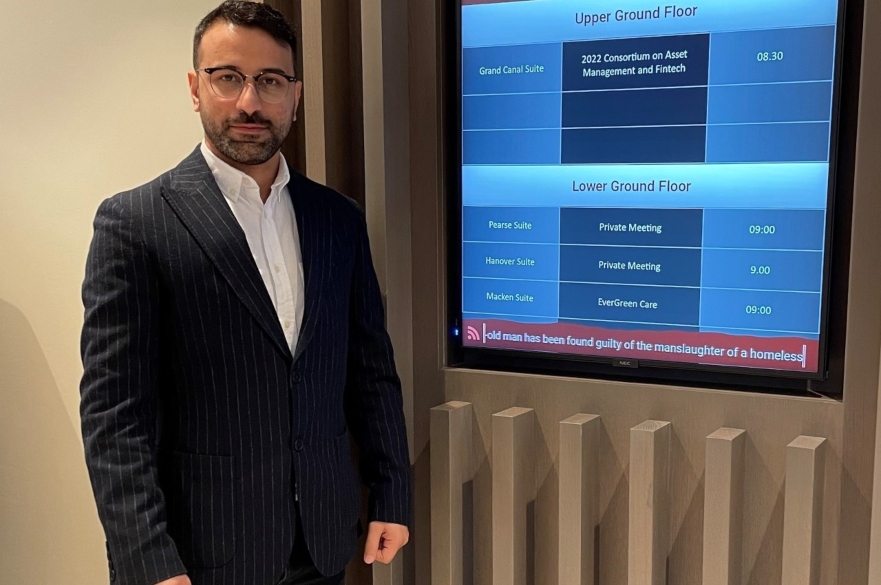USA leading the way in FinTech patent quality according to new index
New research has revealed that the USA is leading the FinTech innovation field when it comes to the quality and quantity of patent applications.
By Helen Breese | Published on 28 February 2023
Categories: Press office; Research; Nottingham Business School;

The findings come as a new index has been created to help companies measure the quality of FinTech patents when making decisions on investments in acquisitions, collaborative partnerships, and licensing agreements which involve intellectual property (IP).
Research led by the new Centre for Finance, Technology and Society at Nottingham Business School (NBS), part of Nottingham Trent University, used key indicators to assess more than 16,000 patents in the FinTech field registered over 20 years.
Through an extensive review of patent quality studies, researchers collected and analysed all possible indicators that have been used to assess the quality of patents in several fields, including but not limited to FinTech.
Patterns of intellectual property registration and protection were then mapped out in three focus areas – the distribution of FinTech patent quality based on different jurisdictions, the distribution of patent quality in relation to specific technical fields (IPCs), and whether there is a correlation between the average FinTech patent quality of firms and their earnings.
Findings show that the USA is the leading jurisdiction both in terms of the number of registered patents and patent quality, accounting for a total of 39.5% of the sample, followed by China (15.5%), Korea (12.2%), Japan (7.8%), and Europe (7.1%). The study also revealed a substantial increase in the rate and quality of registered patents in the USA between 2016 and 2020, and a significant increase in claims counts in some geographical jurisdictions, such as South Korea, illustrating the region’s growth as a jurisdiction with substantial FinTech innovation activities.

Dr Milad Armani Dehghani, lead researcher
Using IPC, which enables users to find a detailed patent document and its technical fields, the research considered several categories - e-shopping or e-commerce, verifying the identity or authority of a user of the system, identification of payer or payee, Payment protocols, and electronic wallets.
The USA is shown to have the most patents in these categories, China and Korea follow, while Europe and Japan have the fewest number of patents for each IPC. In all but electronic wallets – where no significant difference between jurisdictions is found – the USA is again the leading jurisdiction for mean patent quality score.
In relation to organisational quality, the study collected data from 37 companies using the Thomson–Reuters database on Revenue and EBITDA (earnings before interest, taxes, depreciation, and Amortization).
Results showed a statistically significant positive correlation between a company’s average FinTech patent quality and its average earnings. When using EBITDA, again, findings revealed a positive correlation between the average profitability of a company and its patent quality.
A FinTech Patent Quality Index (FPQI) has now been created, which can be used to inform the development and deployment of FinTech technologies.
Furthermore, the FPQI can potentially be used to guide assessments of the quality and value of an organisation’s IP assets and potential in a merger or acquisition situation, or when deciding whether to invest in defending patents held.
The Index also provides a tool for identifying high-quality patents held by organisations that may be targets for alliances, takeovers, or investments.
Beyond industry, the FPQI will allow policymakers to better understand their jurisdictions’ standing in terms of patenting within FinTech, thereby informing policy for improving their jurisdictions’ attractiveness as a destination for FinTech innovation.
Dr Milad Dehghani, lead researcher and senior research fellow at the Centre for Finance, Technology and Society at NBS, said: “Patents in the FinTech sector are being awarded at an accelerating pace; however, due to the early stage of technology progress in some FinTech fields, patents may be linked to indefensible claims and capital raising rather than legitimate technical or business purposes.
Professor James Devlin talks about how the new Centre for Finance, Technology and Society aims to transform the FinTech sector
“So as the FinTech sector evolves, the valuation of organisations with FinTech activities and IP strategies will likely become more critical. Organisations and investors will require practical approaches to valuing IP and commercial portfolios.
“Having up-to-date insights on high-quality patents as enabled by the FPQI, therefore, represents a significant informational and strategic resource for organizations and managers. It provides them with insights on potential organizations to approach, in either a partnership or user capacity."
The full study, which was carried out with University College Cork and Queen Mary University, has been published in the journal IEEE Transactions on Engineering Management. For further information, please contact the corresponding author, Dr Milad Armani Dehghani, at milad.dehghani@ntu.ac.uk
To find out more about the new Centre for Finance, Technology and Society at Nottingham Business school, visit the website.
Notes for Editors
Press enquiries please contact Helen Breese, Public Relations Manager, on telephone +44 (0)115 848 8751, or via email.
About Nottingham Business School at Nottingham Trent University
Nottingham Business School (NBS) at Nottingham Trent University (NTU) is a leader in experiential learning and personalisation of business, management and economics education and research, combining academic excellence with positive impact on people, business and society. NBS has an unrivalled level of engagement with business, public and voluntary organisations. With more than 8,500 students, NBS is also one of UK’s largest business schools.
NBS is Quadruple+ Accredited by EQUIS, AACSB, EFMD BA for International Business, which are globally recognised hallmarks of excellence and quality for business education. NBS is also accredited by Small Business Charter, providing support and development for SMEs. The school is also a PRME Champion and held up as an exemplar and beacon by the United Nations Principles of Responsible Management Education (PRME).
About Nottingham Trent University
Nottingham Trent University (NTU) received the Queens Anniversary Prize for Higher and Further Education in 2021 for cultural heritage science research. It is the second time that NTU has been bestowed the honour of receiving a Queen’s Anniversary Prize for its research, the first being in 2015 for leading-edge research on the safety and security of global citizens.
The Research Excellence Framework (2021) classed 83% of NTU’s research activity as either world-leading or internationally excellent. 86% of NTU’s research impact was assessed to be either world-leading or internationally excellent.
NTU was ranked second best university in the UK in the Uni Compare Top 100 rankings (2021/2022). It was awarded Outstanding Support for Students 2020 (Times Higher Education Awards), University of the Year 2019 (Guardian University Awards, UK Social Mobility Awards), Modern University of the Year 2018 (Times and Sunday Times Good University Guide) and University of the Year 2017 (Times Higher Education Awards).
NTU is the 5th largest UK institution by student numbers, with nearly 39,000 students and more than 4,400 staff located across five campuses. It has an international student population of 7,000 and an NTU community representing over 160 countries.
Since 2000, NTU has invested £570 million in tools, technology, buildings and facilities.
NTU is in the UK’s top 10 for number of applications and ranked first for accepted offers (2021 UCAS UG acceptance data) It is also among the UK’s top five recruiters of students from disadvantaged backgrounds and was the first UK university to sign the Social Mobility Pledge.
75% of NTU students go on to graduate-level employment or graduate-entry education / training within fifteen months of graduating (Guardian University Guide 2021).
NTU is ranked the second most sustainable university in the world in the 2022 UI Green Metric University World Rankings (out of more than 900 participating universities).